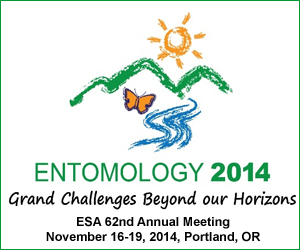Severity of Asian citrus psyllid infestation influenced by elevation, environment and farming practices
Severity of Asian citrus psyllid infestation influenced by elevation, environment and farming practices
Tuesday, March 4, 2014
Embassy Ballroom Prefunction (Embassy Suites Greenville Golf & Conference Center)
Huanglongbing, or citrus greening, is the most limiting factor of citrus production worldwide. The disease is a fastidious bacteria, Liberobacter candidatus asiaticus, and is transmitted by phloem-feeding insects in the family Liviidae, particularly Diaphorina citri. The disease and its vector are both present in Puerto Rico. We used yellow sticky traps to monitor Diaphorina citri populations on different hosts and at different elevations. Our results indicated that there is a significant negative correlation between elevation and the proportion of trees with Diaphorina citri populations and a weaker but significant negative relationship between elevation and the number of Diaphorina citri trapped. We were not able to find psyllid populations above 600 m above sea level. We also found higher than expected populations of Diaphorina citri associated with curry leaf trees, Bergera koenigii. Future studies will expand surveys to include more sites at higher elevations and more samples with Bergera koenigii. These results could be useful in zoning for citrus nursery production and area-wide management programs for the psyllid and the disease.


